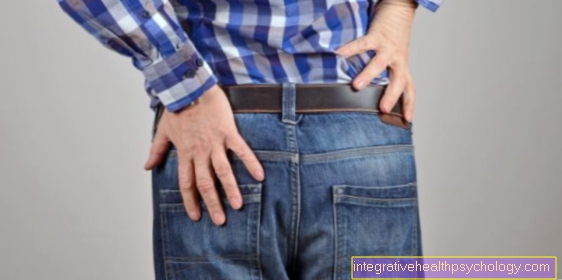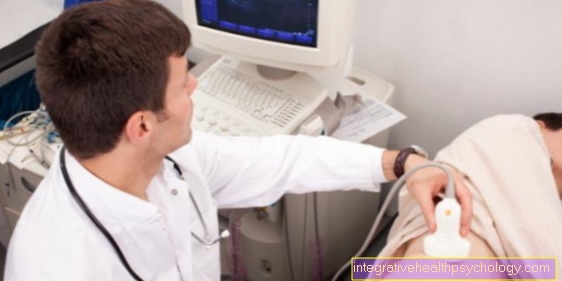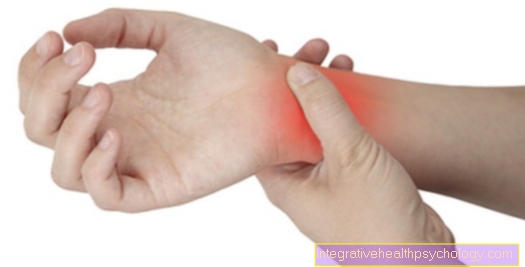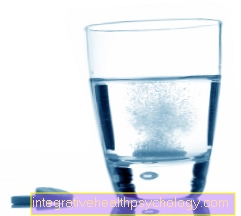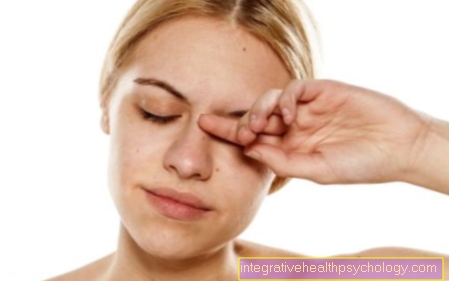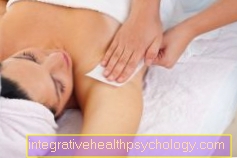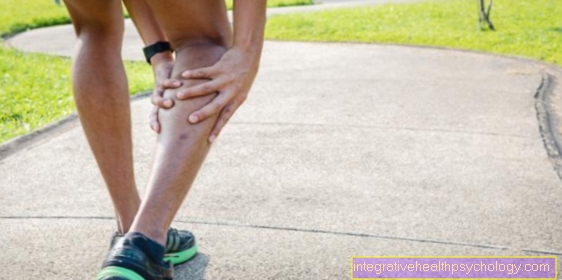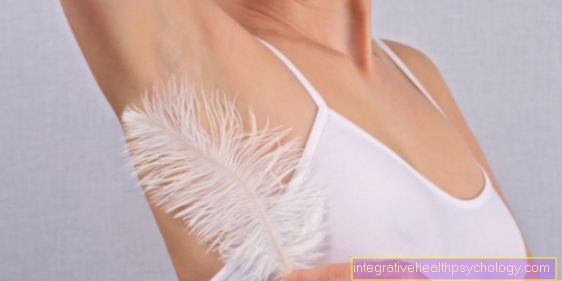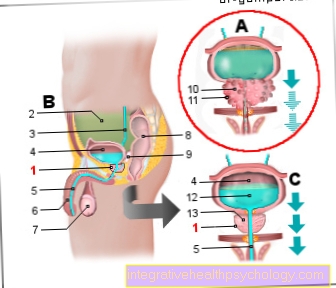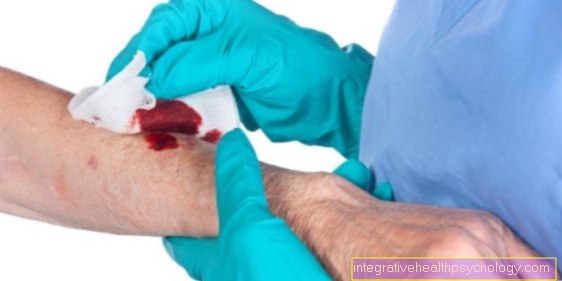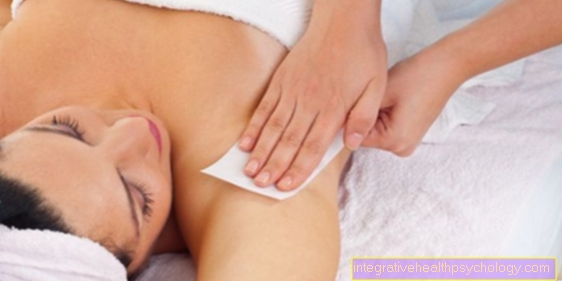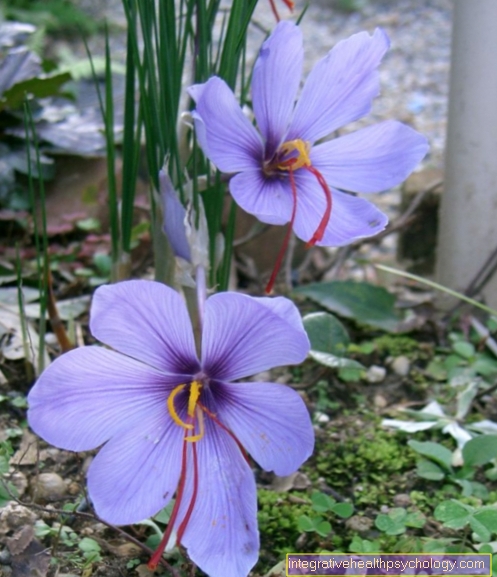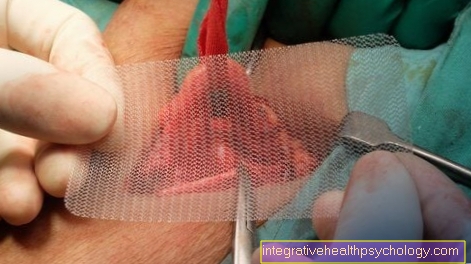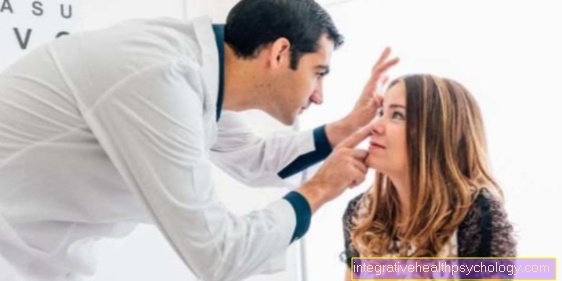Cold sore
Synonyms
medical: herpes labialis, English: lip herpes

introduction
Cold sores are caused by the herpes simplex virus (HSV for short), so it is a viral infection.
There are two different viruses that are responsible for causing cold sores, also called fever blisters, the herpes simplex virus 1 and 2 (or human herpes virus 1 and 2). Both viruses belong to the Herpesviridae family and contain a genome (DNA) made up of deoxyribonucleic acids.
Since the genome of these viruses, just like that of humans, consists of two oppositely running strands (double-stranded DNA), mutants of the herpes simplex virus are extremely rare.
With both virus types, the genome is surrounded by a protective capsule, which ensures that the viruses are highly resistant to soaps and mild disinfectants.
For more information, see the main Herpes article.
transmission
The first infection (Primary infection) usually takes place very early in life, most people are infected with the herpes virus in childhood.
The virus first enters the organism via the mucous membrane, it breaks through the mucous membrane cells and then multiplies at a rapid pace.
The "new" herpes viruses can then from the mucous membrane cells (act as so-called host cells of the herpes virus) emerge and cause the typical symptoms.
The special thing about the viruses that trigger cold sores is the fact that they penetrate the nerve fibers and can penetrate them to the nerve cells (neuron). Once there, they colonize the neuron and survive (persist) there for a long time without the patient showing any visible lip herpes symptoms.
How is the transmission route?
Cold sores are transmitted through contact with infectious secretions from cold sores. It is a droplet or smear infection. A classic route of transmission is kissing a person who currently has a symptomatic cold sore. The virus is often transmitted in childhood. Often relatives, especially parents, transmit herpes by kissing their child. Indirect contact with the secretion can also transmit herpes. If those affected inadvertently touch their lips and then touch other people, this can lead to transmission. Contact with infectious cold sores should therefore be avoided.
How contagious is cold sore?
If the cold sore is symptomatic, there is a high risk of infection for people who are not yet infected with the type 1 herpes simplex virus. Small children and infants therefore have the greatest risk of becoming infected, as more than 85% of adults are already infected with the virus. The content of the cold sore contains a highly contagious secretion that can very quickly lead to transmission. Direct contact with the secretion and the vesicles does not necessarily have to exist; indirect contact is also sufficient for an infection. People with an active cold sore should therefore wash or even disinfect their hands more frequently if they have contact with young children and newborns.
Cold sores are also known as fever blisters. You can read about how contagious fever blisters are in the next article: This is how contagious fever blisters are
How long is cold sore contagious?
Cold sores are basically contagious, but most people are already infected with the virus in adulthood. The virus remains dormant in the body for life, even if it does not cause symptoms. Therefore, the risk of infection in adults is ultimately not that high. Contact with young children, on the other hand, should be avoided with a symptomatic cold sore, as these are usually not yet infected with the virus and can therefore become infected. How long the herpes is contagious also depends on the individual course and treatment of the cold sore. Usually a cold sore takes between 8 and 14 days to heal completely. To be on the safe side, you should not have close contact with risk groups such as newborns and small children until the healing process is complete. However, the duration of infection can also be reduced due to internal therapy with antiviral agents. To be sure, you should consult a doctor more closely.
trigger
Many patients often ask themselves which factors lead to the “dormant” herpes viruses emerging from the nerve cells and triggering an acute cold sore.
Most researchers also disagree on this question. However, psychological factors appear to play a crucial role in the onset of a relapse.
Many patients report that particularly stressful situations provoke a cold sore outbreak. In addition, the weakening of the immune system plays an important role, since the damaging influences of the viruses can no longer be suppressed.
For this reason, many primarily infected people develop cold sores as a result of flu-like infections or the flu.
Furthermore, strong sunlight and a feeling of disgust provokes the outbreak of the disease.
stress
Stress is a typical trigger for a symptomatic phase in cold sores. Situations where the immune system is weakened make it easier for the virus to reactivate. Stress can also cause such a temporary immune deficiency. However, this type of immune deficiency must not be confused with serious, immune-weakening diseases such as HIV. Mental and physical stress can also have a negative impact on the immune system and make it more vulnerable than in phases with less stress. Therefore, cold sores occur preferentially in such phases of life. In stressful times you should therefore pay particular attention to good lip care, for example with a prophylactic care stick, and start treatment at the first signs of herpes.
Symptoms of the cold sore

The first infection (primary infection) just described is quite mild in most cases. Typical cold sore symptoms are greatly reduced or not at all.
This fact can be explained by the fact that the number of infectious pathogens is still comparatively low at this point in time. Typical small blisters can appear on the face, especially on the lips.
This primary infection is followed by a period in which no symptoms are discernible. At this time the herpes viruses have embedded themselves in the neurons and linger there without conveying their pathogenic influences.
The reactivations are more violent than the primary infection in the majority of those infected.
Most patients report a feeling of tightness in the lip area, the first sign of an impending outbreak of disease. The affected lip areas then begin to itch and noticeably burn. From this moment on, it only takes hours to days for the infection to break out completely.
The vesicles are usually visible for about five days to two weeks before they gradually resolve.
Read more about this at: Symptoms of herpes
Pain
Cold sores are not only a cosmetic problem, but unfortunately they also cause pain. The pain often has a burning or stabbing character and precedes the formation of blisters. Those affected often describe a kind of uncomfortable feeling of tension. The intensity of the pain varies widely and depends heavily on the individual course of the disease. In the treatment of cold sores, however, painkillers play a rather subordinate role. While anti-inflammatory pain relievers such as ibuprofen or aspirin can be used, they are not as effective as they are for other conditions. As soon as the first signs of a cold sore appear, local therapy with a cold sore cream should take place. With early therapy, the chances are good that the herpes will heal quickly and not cause severe pain.
Find out more here: Burning lips
Swelling of the entire lips with cold sores
Some people with severe swelling of the lips develop when they are going through a symptomatic phase of cold sores. Although the swelling is not necessarily painful, those affected find it very uncomfortable. The swelling usually occurs at the same time as the formation of blisters. Basically there is not much that can be done about such a swelling. Cooling is often felt to be very beneficial. Cold washcloths or cooling elements are very suitable for this. However, they should be washed hot and disinfected after use.
What are the typical signs of cold sores?
There are a few harbingers of a cold sore outbreak upfront. Many sufferers notice a feeling of tension on the lip and the surrounding skin a few days before the typical blistering. Slight redness, itching or a burning sensation can also be signs of an impending cold sore. As soon as the disease breaks out, you can see vesicles the size of a pinhead that stand together in small groups. This is why the vesicles are also called grouped. Unlike other infections, cold sores usually do not cause general symptoms such as feeling sick or fever.
Read more about this at:
- Rash around the mouth
- Blistered rash
What is the course of cold sores?
In most people, cold sores are associated with a chronically recurrent course. The first infection with the herpes virus often takes place in childhood. This usually goes unnoticed as it does not necessarily cause symptoms. In some cases the initial infection is symptomatic, in the sense of tonsillitis and throat inflammation or inflammation of the oral cavity.
The virus then slumbers in the infected person's body for a lifetime without forcibly causing symptoms. It is in a so-called latency and hides in the nerve nodes (ganglia). From there, the virus can be reactivated and cause a symptomatic cold sore. A reactivation occurs particularly in phases in which the immune system is weakened. Triggers are typically infections, exposure to the sun, stress or other underlying illnesses. How often those affected are plagued by such symptomatic phases varies greatly. For some people the phases are frequent, for others rather rare. However, the virus cannot be cured.
Scars after cold sores
Many sufferers worry about whether cold sores can leave scars. Usually, however, a cold sore heals without scarring. In some cases, after a cold sore has healed, small pink spots can be found on the lip. These are not scars either. They also heal within several weeks without any consequences. Just scratching the vesicles can cause scars.
Cold sores during pregnancy - danger to my baby?
Infections are particularly feared during pregnancy, but the all-clear can be given for cold sores. A mother's cold sore during pregnancy does not pose a risk to the unborn child.
In contrast to other infections, there is no risk of malformations or developmental disorders, and the risk of premature birth or miscarriage is not increased. In very rare cases, however, the herpes simplex-1 virus, which usually causes cold sores, can also cause genital herpes. The transmission takes place mainly through oral sex. Genital herpes can pose an obstetric risk and is therefore treated with antiviral drugs, including during pregnancy. In some cases, a caesarean section may even be necessary.
Read more about this at:
- Zovirax® in pregnancy
- Rash in pregnancy
Cold sores in babies - how dangerous is it?
Cold sores is usually a harmless condition, but cold sores can also be very dangerous for babies. Newborns do not yet have as mature an immune system as adults or older children and should therefore be protected from infection with the herpes. Herpes can lead to complications such as meningitis or blood poisoning (sepsis), especially in the first six weeks of life. This is only very rarely the case, but it should be noted.
Babies who are already infected with herpes receive antibodies from their mother during pregnancy, which offer a certain protection after birth. This is also known as loan immunity. However, the protection is not 100% sure, which is why you should make sure that the child does not come into contact with the virus if you have symptomatic cold sores. Frequent hand washing, no kissing of the child and a face mask when breastfeeding are mandatory. Herpes can cause serious harm to babies. These include infections of the conjunctiva and inflammation of the oral mucosa, as well as meningitis, encephalitis and an attack on other organs. However, at the first signs of infection, antiviral therapy is initiated quickly.
Read more about this at:
- Herpes in the baby
- Herpes simplex encephalitis
Duration of cold sores
Cold sores is a chronic, relapsing disease. This means that the disease progresses in phases that occur differently over the course of a lifetime. These phases of the disease can be treated, but the virus is not completely cured.
The duration of the phases of the disease is very different and depends on the individual course of the herpes. The frequency of episodes of illness can also vary greatly. In the case of an uncomplicated cold sore, a phase of illness usually lasts between seven and fourteen days until no more symptoms are seen. However, more complicated courses can also be associated with longer periods of illness lasting several weeks. The treatment of cold sores also plays an important role in the duration of the illness. Early treatment can shorten the disease phase by a few days.
Read more at: Duration of cold sores
Duration of the vesicles
The symptomatic phases of cold sores are not always the same. The duration of the vesicle phase can also differ depending on the individual and the herpes episode. On average, the annoying vesicles last between four and seven days before they burst and can no longer be seen as vesicles. However, treatment with an antiviral agent such as acyclovir can shorten this phase. The use of drying ointments such as zinc ointment shortens the life of the blisters. However, this does not mean that the infection is no longer there or active.
How long is the incubation period?
The incubation period of a pathogen is the time between when the pathogen enters the body and the first symptoms appear. The first infection with a herpes virus often happens in childhood and is asymptomatic. The virus is often not reactivated until years later. In this case, the cold sore breaks out. People who are currently suffering from a cold sore can then pass it on to others. The incubation period for this infection is a few days. On average it is about 3 to 10 days.
Can you permanently cure cold sores?
The annoying cold sore is caused in most cases by the herpes simplex virus type 1. Lately there have also been increasing numbers of people in whom the herpes simplex virus type 2 is the cause of cold sores. In both cases it is a virus that remains in the body for a lifetime after being infected for the first time. It slumbers in the nerve nodes and can be reactivated at any time in the event of an immune deficiency. The virus remains in latency in the nerve cells. The cold sore can be treated, but it never heals completely. The antiviral agents that are used in the therapy of cold sores can inhibit the growth of the virus, but not kill it completely. A permanent cure is therefore not possible.
Therapy of cold sores

There are two different starting points in general lip herpes therapy. On the one hand, drugs are preferred which are used to reduce symptoms quickly (Blisters, itching, redness), on the other hand it seems much more sensible to protect the infected person from an outbreak of cold sores.
Since the immune system seems to play a crucial role in the onset of a cold sore, this can be achieved with the help of drugs that strengthen the immune system.
However, the main branch of therapy is still limited to accelerating the healing of an existing cold sore.
Externally applicable creams and ointments based on the virustatic (Inhibition of reproduction) Active ingredient acyclovir, are only able to alleviate the symptoms during an outbreak phase. They alleviate the pain, lower any fever that may occur and accelerate the drying out of the fluid-filled blisters.
Other important active ingredients in lip herpes therapy are valaciclovir, famciclovir and penciclovir.
They can be taken in the form of tablets and also work by preventing the virus from multiplying.
In addition, these preparations should be able to significantly lengthen the time span between two lip herpes outbreaks and thus keep the affected person free of symptoms for a long time. Common side effects of medicinal products in herpes therapy are digestive tract complaints (diarrhea and nausea).
In addition, some users report having circulatory problems, dizziness and / or headaches. The use of drugs based on acyclovir, valaciclovir, famciclovir and penciclovir is now controversial in expert circles, since they no longer have any effect on many patients.
This fact can be explained by the fact that the relevant viruses have developed resistance to the active substances over time.
Read more about this at:
- Antiviral drugs
- How can you strengthen the immune system?
Which cream works best?
Many people who suffer from cold sores often spend a long time looking for a cream that works well for them. Which cream ultimately works best depends on various factors, such as the individual course of the cold sore and subjective feeling. Therefore, this question cannot be answered universally.
However, there are creams that are very popular with many people. The Lomaherpan® cream, which contains lemon balm, is very popular with many sufferers. It is applied several times a day at the first signs of a cold sore. The natural active ingredient is particularly suitable for uncomplicated cold sores.
Creams that contain the antiviral agent acyclovir are also popular. Examples are the Zovirax® cream, Aciclobeta® cream or Aciclovir-Heumann. A very good, drying cream is Virudermin®, which contains zinc sulfate. In the real sense, it is not a cream, but a paste that should be applied very thinly at the first signs of herpes. Many sufferers find this paste very effective and especially praise the natural ingredients.
Read more about this at: Cold sore creams
Zovirax
Zovirax® is a popular cream that is used to treat cold sores.It is sold by the GlaxoSmithKline group of companies and can be purchased in pharmacies as well as in online shops and online pharmacies. The cream contains the active ingredient acyclovir, which has an antiviral effect. Acyclovir fights the herpes viruses by stunting their growth, helping to speed up the healing of a recurring cold sore.
It relieves itching and pain and promotes rapid crust formation in cold sores. The cream should be used at the first signs of a cold sore episode in order to maximize the success of the treatment. The first signs may be a burning sensation, itching, a feeling of tightness, redness, swelling or blisters. Zovirax should also be used during the blistering phase. Unless otherwise prescribed by your doctor, Zovirax should be applied thinly to the affected areas of skin five times a day, four hours apart. The cream can be applied with a clean finger or a cotton swab. When using it, it is important to ensure that not only the skin changes that are already visible, but also the adjacent skin, are covered with the cream.
Lomaprotect
LomaProtect® is a lip care stick that is used to care for the lips during the vesicle-free intervals. Cold sores is a chronic infection that is characterized by the alternation of symptom-free and symptomatic phases. In symptom-free phases, LomaProtect is supposed to care for and protect the lips. The care stick, which is similar to conventional lip care sticks, contains castor oil, lemon balm leaf extract, and UV-B and UV-A protection. The UV protection prevents sun-related damage and stress on the lips.
This is also intended to prevent a symptomatic herpes phase. The lemon balm leaf extract is also used to protect the lips and provide care during the symptom-free phase. The pen can be used any number of times a day. However, it is not suitable for treatment during a symptomatic phase of herpes.
Read more about this at: UV radiation
Zinc ointment
In many forums you can read recommendations on the use of zinc ointment for cold sores. The use of zinc ointment for cold sores is also often recommended by experts. Ointments with added zinc have drying properties, which is why they are used for various skin diseases. Some sufferers perceive the drying effect of the zinc ointment subjectively as a progress in treatment, as they dry out the cold sore. It also has an anti-inflammatory effect.
However, the zinc ointment is not effective against the herpes virus itself, which is why it can only lead to treatment progress to a limited extent. The use of a zinc ointment should ultimately be considered on the basis of subjective feelings. However, zinc ointment is particularly recommended for the prodromal phase of cold sores. This is the phase in which the first signs of a cold sore are felt, but there are still no blisters. Especially in the case of uncomplicated cold sores, the use of zinc ointment is often even more sensible than a comparable aciclovir ointment, since resistance of the virus to acyclovir is now known. In the vesicular stage, drying mixtures such as zinc paste or zinc sulfate hydrogel can also be used.
Which drugs work best?
Cold sores are an annoying and constant companion for many people. Those affected often try many different medications, care sticks and lip creams until they find products that work for themselves. Which drugs are best for treating cold sores?
There is no general answer to the question. In the end, creams from different suppliers differ only slightly because they contain the same ingredients. A lip cream that contains an antiviral agent such as acyclovir or foscarnet or penciclovir is suitable for combating the first signs of a cold sore.
For example, the Triapten antiviral cream, which contains the active ingredient Foscarnet, or the products Zovirax and Fenistil Pencivir are recommended. The latter contain the active ingredients acyclovir (Zovirax®) and penciclovir (Fenistil® Pencivir). However, if the cold sore is uncomplicated, such antiviral creams cannot be unreservedly recommended. They are expensive and there is already resistance to some active ingredients. At an early stage, creams with zinc sulfate, such as Virudermin, are also highly recommended.
A cream that contains cortisone is recommended for painful accompanying inflammation. The cortisone is anti-inflammatory and promotes healing. One example of this is the prescription-only Fucicort® cream, which also contains a disinfecting agent.
If the herpes is already in its blistering stage, it is advisable to resort to local therapy that has a drying effect. Fat ointments, on the other hand, make herpes worse. The Labiosan® zinc paste, which dries out the blisters, is a good local therapy. A zinc sulfate hydrogel is also highly recommended.
If crusts have formed, a nourishing cream such as panthenol cream can be used. In the case of severe herpes, apart from external therapy, internal therapy with antiviral agents such as aciclovir, valaciclovir or foscarnet is recommended. This can take the form of tablets as well as infusions and has to be adjusted individually.
For more information on pencivir read our article: Pencivir - anti-viral for cold sores
Plaster against cold sores
There are many different products against cold sores, such as creams, pastes, but also plasters. These patches are often called patches and cover small cold sores. An example of such a product are Compeed's herpes patches. There are no active antiviral agents in this product.
The patch supports wound healing and shields the vesicle from external stimuli. It relieves itching and pain, and dries out the sore. Once applied, the patch should not be removed until it is slowly loosening on its own. The Zoviprotect patch is a similar product. Patches against cold sores should be used primarily during the healing phase of the herpes and not at the first signs of a cold sore. Cold sore patches are applied to clean and oil-free skin. After the patch has been applied, oil-free makeup and powder can be applied to mask the herpes somewhat.
Homeopathy for cold sores
There are also many - inconsistent - recommendations from homeopaths for the use of homeopathic remedies for cold sores. These recommendations are not based on scientific evidence, unlike conventional medicines. The effect of homeopathic remedies is therefore very controversial.
The remedies are recommended based on the symptoms and the condition of the person affected and often also include the emotional situation. However, it is expressly not advisable to seek homeopathic treatment if you suffer from recurring cold sores or particularly severe symptoms. In this case, therapy with an antiviral agent is absolutely necessary.
The following is a brief overview of various homeopathic remedies for cold sores:
1. Sodium muriaticum: This remedy is recommended for those with a sad and vulnerable mood and cold sores. The blisters are caused by heat or a fever. The person sweats a lot and is very thirsty.
2. Rhus toxidodendron: The remedy is recommended for extremely painful, oozing and burning cold sores. The blisters are triggered by feverish infections and physical overexertion. The symptoms are often worst in the evening.
3. Sepia: Sepia is recommended for cracked, dry cold sores that tend to crust. In women, hormone fluctuations are the main trigger for cold sores.
Read more about this at: Homeopathy for cold sores
Home remedies for cold sores
In order to treat an acute cold sore and to alleviate the symptoms, one does not necessarily have to resort to expensive medicines.
In many cases, cold sores can be solved by using some home remedies.
Honey is considered to be the miracle cure in the fight against the annoying blisters that an acute attack brings with it. It can simply be applied to the open areas of the mouth and / or nose several times a day.
The antibacterial effect of honey has a disinfectant effect on the herpes vesicles and also kills viruses efficiently. In addition, it alleviates possible skin irritation and accelerates the healing process.
Another tried and tested home remedy is tea tree oil, which also has an antibacterial effect and is able to kill herpes viruses. Furthermore, tea tree oil has the property that it removes water from the skin cells and thereby dries them out. The fluid-filled herpes vesicles dry out more quickly when tea tree oil is applied and the open areas heal more quickly.
Even skin that is sometimes extremely itchy can be targeted with the help of a simple home remedy. Lemon balm is ideal for soothing the damaged skin cells and relieving itching.
Toothpaste is also used as an aid in the treatment of cold sores, it quickly dries out the fluid-filled blisters and in this way accelerates the healing process.
It is important to ensure that neither toothpaste nor lemon balm oil is able to kill the herpes viruses. For this reason, they should only be used in combination with antibacterial substances (for example honey or tea tree oil) be applied.
Cloves are also said to have a soothing effect on cold sores with the help of their antioxidant and antiviral properties. They are able to significantly reduce the activity of the relevant viruses and, according to studies, even act on those viruses that have already developed resistance to the herpes medication used in conventional medicine.
At the first signs of a new outbreak (usually the feeling of tension in the area of the lips), the intake of zinc and vitamin C should prevent the infection from flaring up.
Read more on the topic: Home remedies for cold sores
Tea tree oil
Tea tree oil is a common home remedy for cold sores. Tea tree oil is of historical importance because it was used as an early "antibiotic" due to its antimicrobial properties in the late 18th century. Some people already use tea tree oil at the first signs of a cold sore, such as a tingling sensation on the lips or a feeling of tightness. The oil is applied to the skin several times a day with a clean cotton swab. However, the benefits and effectiveness are very controversial. Tea tree oil can also cause skin irritation and so-called contact dermatitis, which is why it should be consumed with caution. Undiluted tea tree oil should therefore not be used. Before using it, you should seek advice from a doctor or pharmacist.
What is the best way to prevent cold sores?
There are various recommendations to prevent cold sores circulating, but they are very controversial. Over 85% of adults are already infected with type 1 herpes simplex virus. This is the most common cause of cold sores.
The infection already occurs in early childhood in the family environment and then remains symptom-free for a long time. A person who is already infected with the virus does not necessarily have to avoid contact with people who currently have symptomatic cold sores. The probability of already being infected is very high. Even with contact with infectious secretions, there is nothing to fear in this case. Contact should only be avoided with children and babies, as they can still become infected. Nevertheless, as an adult, you can of course avoid contact with people who have symptomatic cold sores if you feel more comfortable as a result. If you have already suffered a cold sore, you should avoid triggering factors such as stress or strong sunlight. You can use nourishing lipsticks that contain UV protection against the latter.
Cold Sores - Can It Be An indication of HIV?
A cold sore is found in very many people. Most people are infected with the herpes virus that causes cold sores. Whether a cold sore breaks out or not depends on various factors. An infection with the HI virus, or HIV for short, leads to an impairment of the immune system. Nowadays, most people in Germany who are infected with HIV are treated with modern drugs. A cold sore can of course also occur with HIV, but it is not a sign of HIV infection. With HIV infection there is a risk of very severe cold sores. Often other skin areas are also affected and months of progress are typical.
Other things about cold sores
About 80 to 90 percent of all people are latently infected with the herpes virus; blood be detected.
But not all of these people have had an outbreak of lip herpes with blistering. Only slightly 40 percent of those latently infected already had an outbreak of the disease.
At 10 to 20 percent of the infected, there are repeated, recurring outbreaks of cold sores. Based on these figures, it can be concluded that infection with the herpes virus is not always possible (rather in very few cases) leads to an actual onset of the disease.
However, since the number of with Herpes infected (so-called Infection rate) is enormously high, many pregnant women worry about whether the virus can be dangerous for their unborn child.
This question can generally be answered with "No“Answer, because the herpes viruses are not capable of the placenta to penetrate and infect the unborn child. An exception are those herpes viruses that trigger what is known as genital herpes.

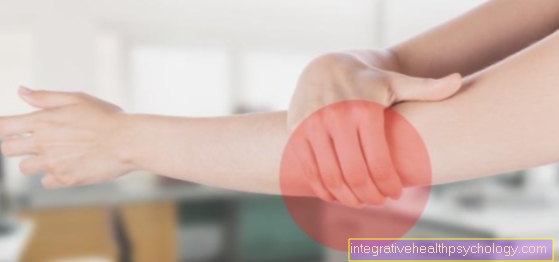

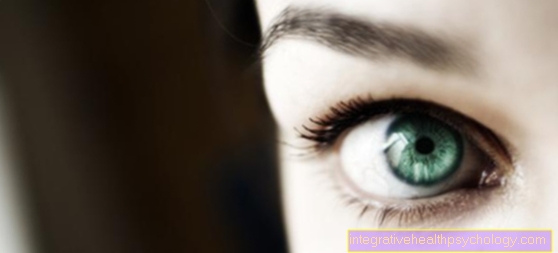
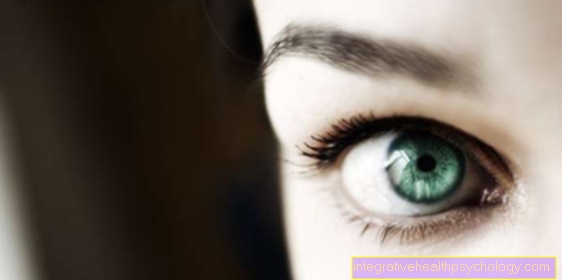

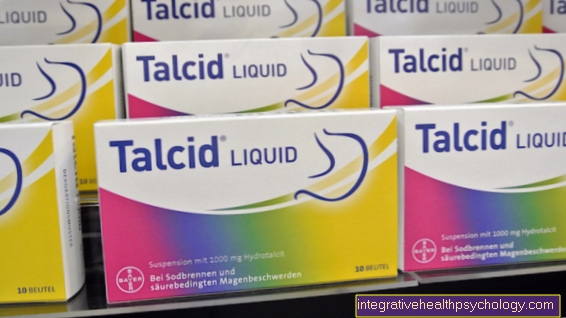
-mit-skoliose.jpg)

